BBS Second Macro Economics
Chapter: 8
Government Finance
What is Fiscal Policy? What are the objectives of Fiscal policy? Key components of fiscal policy? Types of fiscal policy?
What is fiscal policy?
Fiscal policy refers to the use of government spending and taxation to influence the economy’s overall performance and achieve specific economic objectives.
It is one of the essential tools in the government’s economic policy to manage the economy.
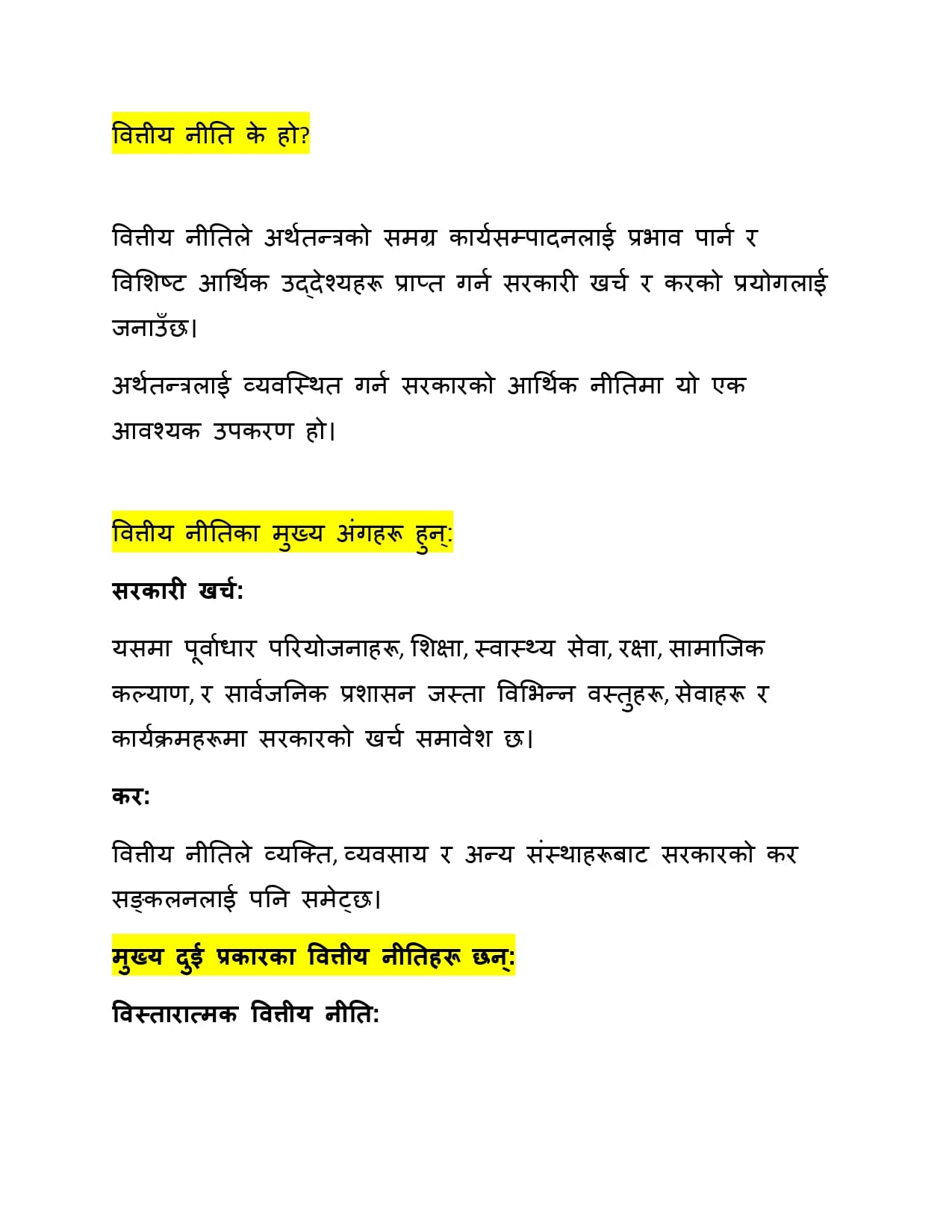
The key components of fiscal policy are:
Government Spending:
This involves the government’s expenditure on various goods, services, and programs, such as infrastructure projects, education, healthcare, defense, social welfare, and public administration.
Taxation:
Fiscal policy also encompasses the government’s collection of taxes from individuals, businesses, and other entities.
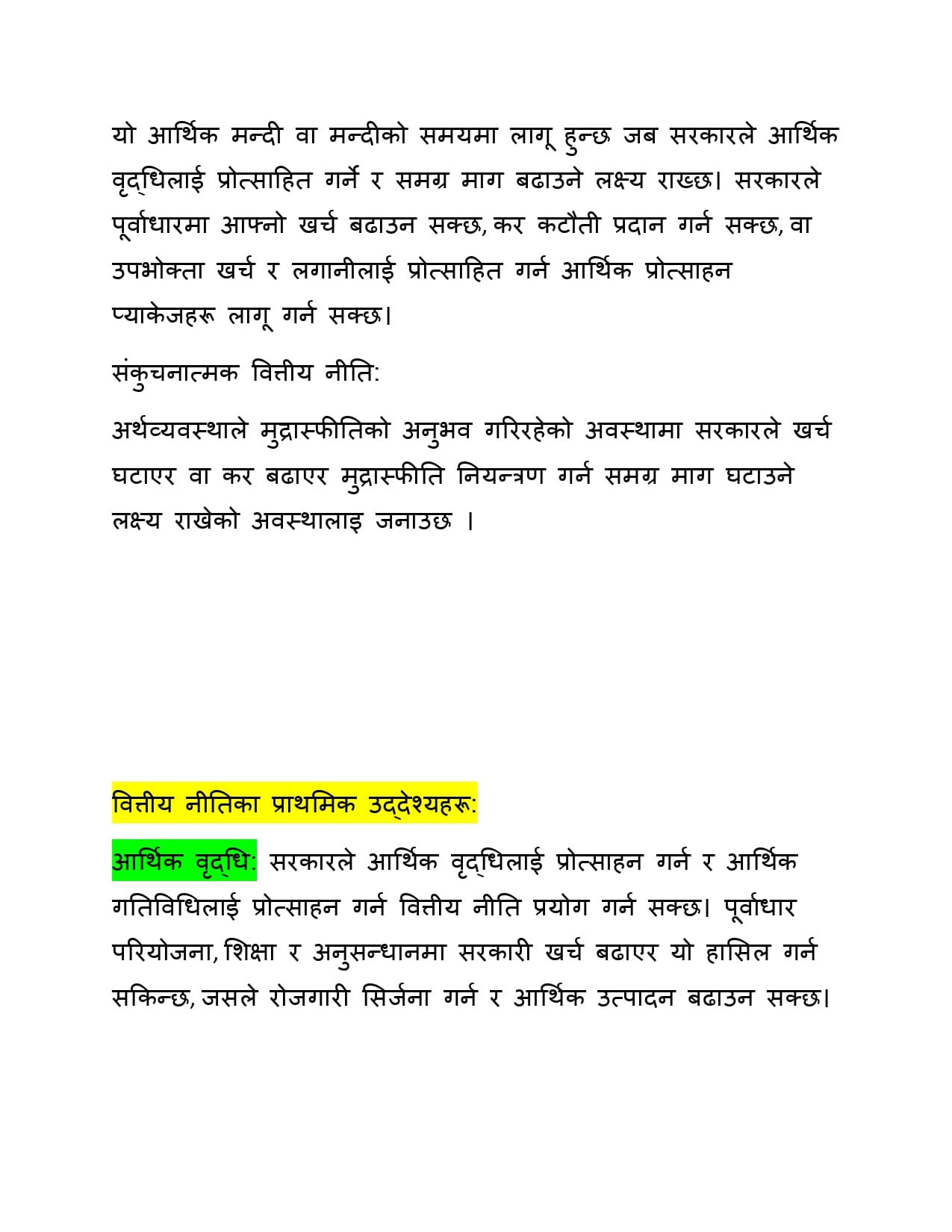
There are two main types of fiscal policy:
Expansionary Fiscal Policy:
This is implemented during economic downturns or recessions when the government aims to stimulate economic growth and increase aggregate demand. The government may increase its spending on infrastructure, provide tax cuts, or introduce economic stimulus packages to encourage consumer spending and investment.
Contractionary Fiscal Policy:
This is used when the economy is experiencing inflation or is overheating. The government will aim to reduce aggregate demand to control inflation by cutting spending or increasing taxes, thereby cooling down the economy.
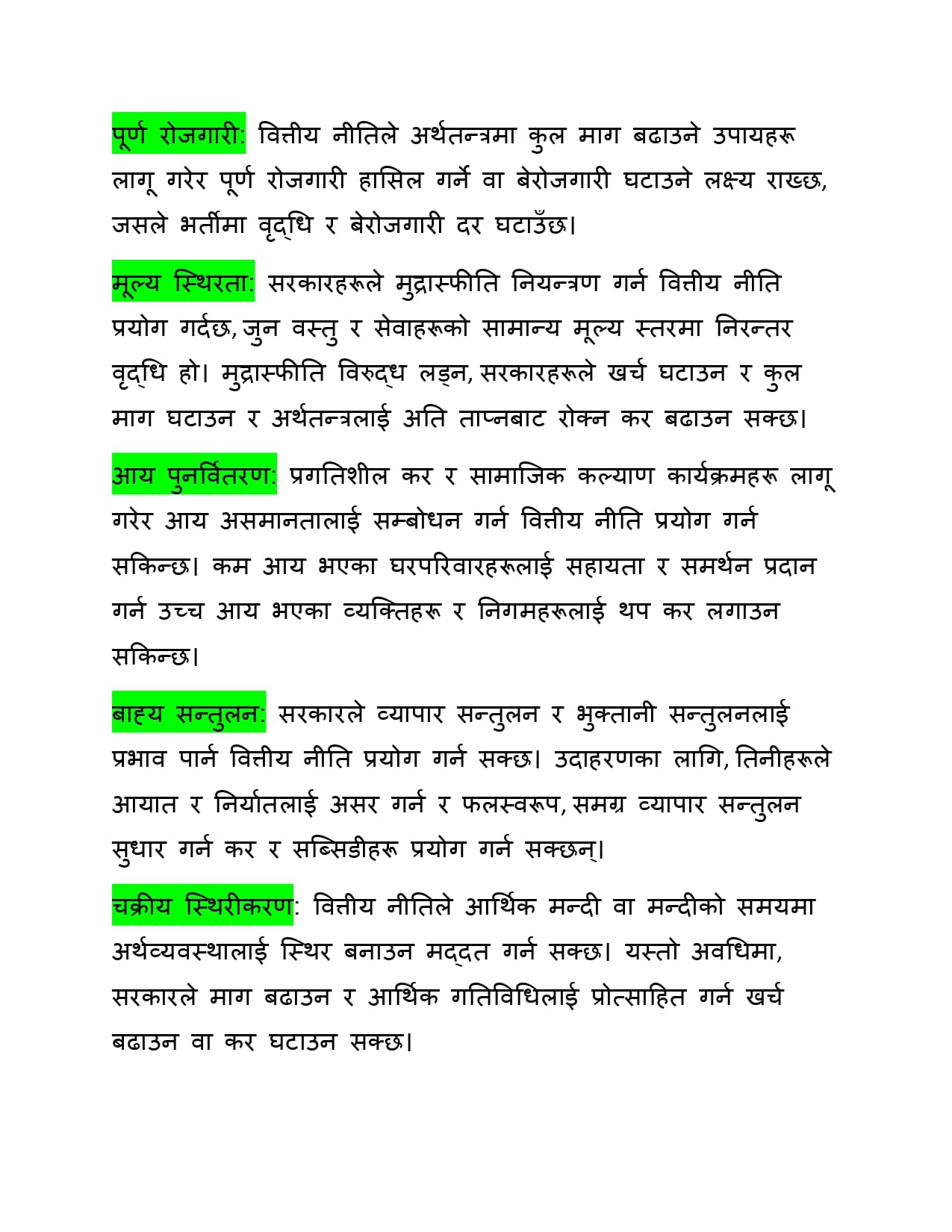
The primary objectives of fiscal policy can include:
Economic Growth: Governments can use fiscal policy to encourage economic growth and stimulate economic activity. This can be achieved by increasing government spending on infrastructure projects, education, and research, which can create jobs and boost economic output.
Full Employment: Fiscal policy aims to achieve full employment or reduce unemployment by implementing measures that increase aggregate demand in the economy, leading to increased hiring and lower unemployment rates.
Price Stability: Governments use fiscal policy to control inflation, which is the sustained increase in the general price level of goods and services. To combat inflation, governments may reduce spending and increase taxes to reduce aggregate demand and prevent the economy from overheating.
Income Redistribution: Fiscal policy can be used to address income inequality by implementing progressive taxation and social welfare programs. Higher-income individuals and corporations may be taxed more to provide assistance and support to low-income households.
External Balance: Governments can use fiscal policy to influence the balance of trade and balance of payments. For instance, they may use taxes and subsidies to affect imports and exports and, in turn, improve the overall trade balance.
Counter-cyclical Stabilization: Fiscal policy can help stabilize the economy during economic downturns or recessions. During such periods, the government may increase spending or reduce taxes to boost demand and stimulate economic activity.
Long-term Fiscal Sustainability: Fiscal policy should also aim to maintain long-term fiscal sustainability, ensuring that government revenues and expenditures are on a sustainable path over time. This is essential to avoid excessive public debt levels that can lead to fiscal crises.
It’s important to note that the effectiveness of fiscal policy can vary depending on the economic conditions, the political climate, and the magnitude and timing of the measures implemented. Additionally, fiscal policy works in conjunction with other economic policies, such as monetary policy (controlled by central banks), to achieve overall economic stability and growth.
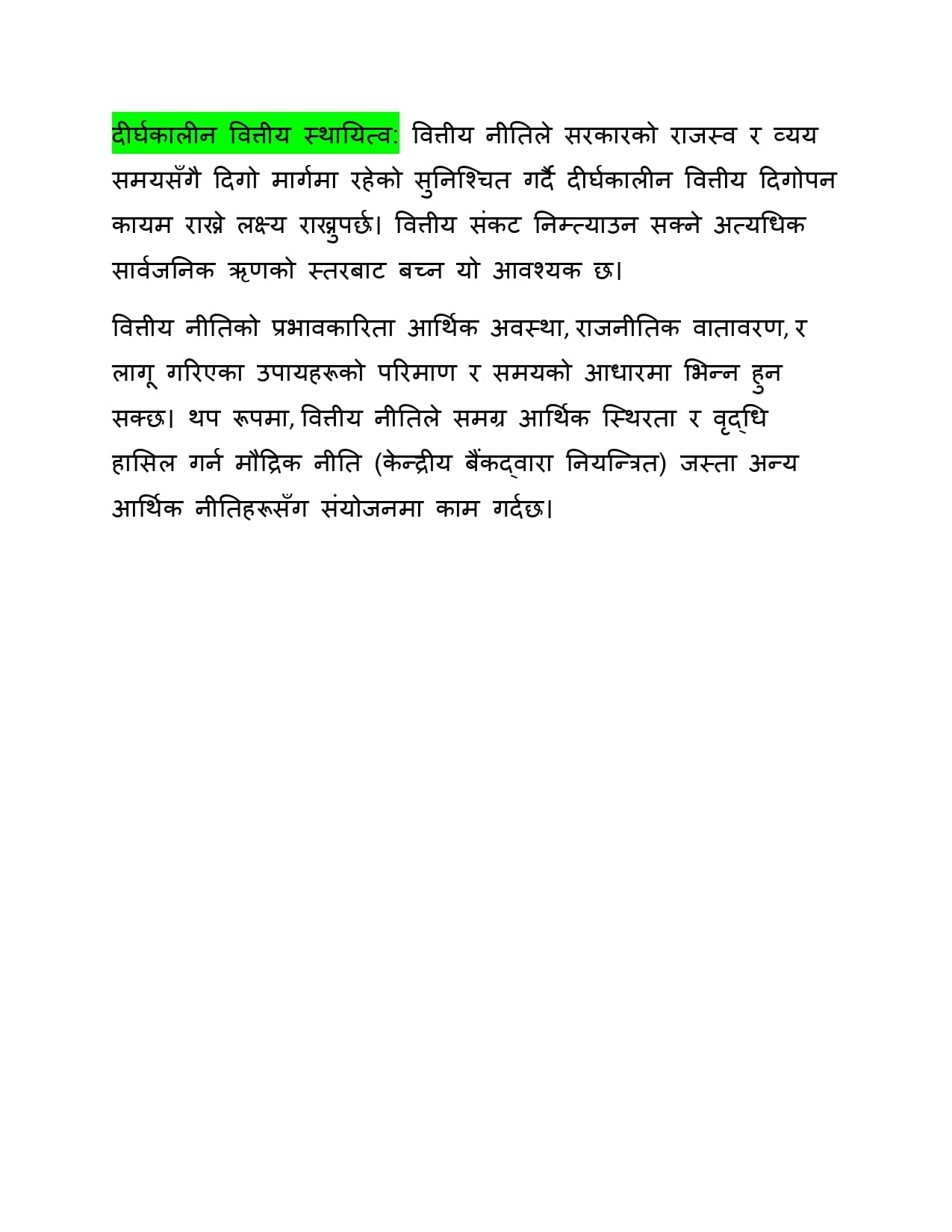

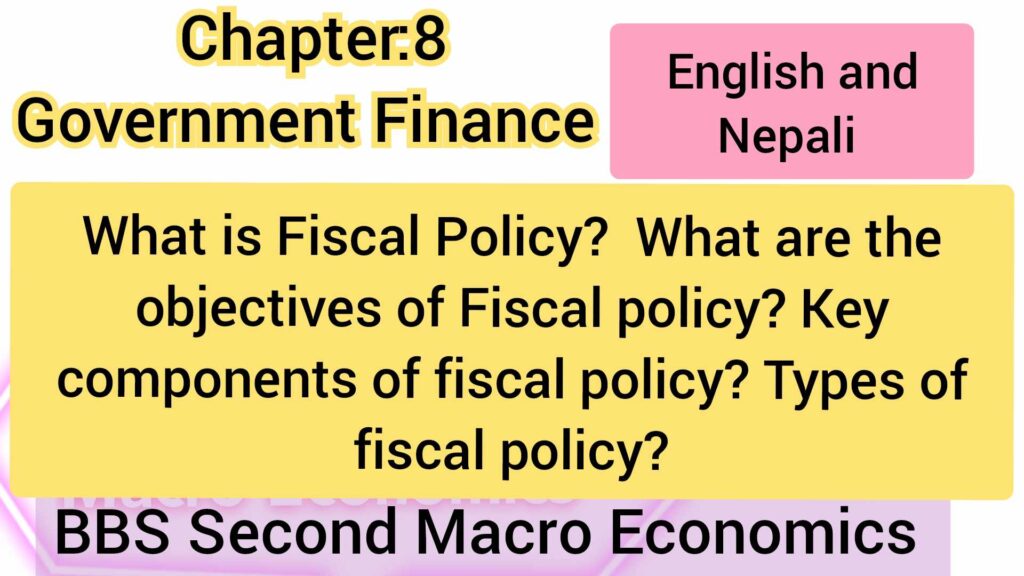
360 Comments
Pingback: Fiscal Policy: Important Question Answer: BBS Second Macro Economics - NEB NOTES
india online pharmacy http://indiaph24.store/# indian pharmacy online
reputable indian online pharmacy
india online pharmacy http://indiaph24.store/# best online pharmacy india
online pharmacy india
https://mexicoph24.life/# mexico pharmacies prescription drugs
indianpharmacy com Generic Medicine India to USA best india pharmacy
pharmacies in mexico that ship to usa: Mexican Pharmacy Online – mexican online pharmacies prescription drugs
http://cytotec.club/# cytotec buy online usa
http://cytotec.club/# Misoprostol 200 mg buy online
lisinopril 0.5 mg: zestril online – lisinopril for sale uk
ciprofloxacin 500 mg tablet price purchase cipro п»їcipro generic
lisinopril 250 mg prescription medicine lisinopril lisinopril 200 mg
https://cytotec.club/# Misoprostol 200 mg buy online
buying cheap propecia without a prescription buy cheap propecia no prescription cost of cheap propecia without a prescription
http://finasteride.store/# order generic propecia without prescription
https://lisinopril.network/# buying lisinopril online
zestril 20 mg cost: ordering lisinopril without a prescription uk – prinivil 20 mg tablet
order generic propecia without dr prescription cost propecia prices propecia otc
http://cytotec.club/# Abortion pills online
tamoxifen and antidepressants: low dose tamoxifen – tamoxifen warning
lisinopril 12.5 20 g lisinopril prices lisinopril 2019
https://nolvadex.life/# nolvadex for pct
alternatives to tamoxifen nolvadex only pct pct nolvadex
https://nolvadex.life/# tamoxifen dosage
ciprofloxacin 500 mg tablet price: buy cipro online – ciprofloxacin mail online
lisinopril medication buy lisinopril 10 mg 2 prinivil
https://cytotec.club/# buy cytotec over the counter
buying generic propecia without dr prescription: cost generic propecia online – get propecia price
cytotec pills buy online buy cytotec online fast delivery buy cytotec in usa
http://cytotec.club/# purchase cytotec
Abortion pills online: cytotec pills online – Misoprostol 200 mg buy online
http://nolvadex.life/# tamoxifen and bone density
generic propecia no prescription propecia without rx cost generic propecia
https://cytotec.club/# buy cytotec online
tamoxifen blood clots: how to prevent hair loss while on tamoxifen – generic tamoxifen
tamoxifen cost tamoxifen endometrium tamoxifen bone density
http://cytotec.club/# Abortion pills online
tamoxifen hot flashes: hysterectomy after breast cancer tamoxifen – nolvadex 20mg
lisinopril prescription 60 mg lisinopril price for 5 mg lisinopril
http://cytotec.club/# buy cytotec online fast delivery
https://cytotec.club/# buy cytotec
buy cytotec over the counter buy cytotec buy cytotec online
buy propecia online: buy cheap propecia no prescription – propecia without dr prescription
http://finasteride.store/# generic propecia
what happens when you stop taking tamoxifen where to buy nolvadex tamoxifen headache
purchase cytotec: purchase cytotec – buy cytotec
http://cialist.pro/# Buy Tadalafil 10mg
order viagra: Cheapest place to buy Viagra – Order Viagra 50 mg online
https://levitrav.store/# Buy Vardenafil online
Buy generic Levitra online Levitra generic price Buy Vardenafil 20mg
https://kamagra.win/# super kamagra
Vardenafil buy online Levitra generic price Levitra generic best price
http://cenforce.pro/# buy cenforce
Buy generic Levitra online: Levitra generic price – Vardenafil price
buy cialis pill: buy cialis overseas – Generic Cialis without a doctor prescription
Buy Vardenafil 20mg levitrav.store Buy Vardenafil online
https://viagras.online/# sildenafil over the counter
Order Viagra 50 mg online: Cheap Viagra 100mg – cheap viagra
http://kamagra.win/# Kamagra Oral Jelly
Vardenafil buy online Levitra generic best price Vardenafil price
Buy Vardenafil online: Levitra 20mg price – Vardenafil price
http://levitrav.store/# Levitra 20 mg for sale
п»їLevitra price Buy Vardenafil 20mg Vardenafil buy online
https://cialist.pro/# Cialis without a doctor prescription
Buy Cialis online: Cialis 20mg price in USA – Tadalafil price
Cheap generic Viagra: buy Viagra online – Viagra without a doctor prescription Canada
https://cenforce.pro/# Cenforce 100mg tablets for sale
Buy Cenforce 100mg Online cenforce for sale cenforce for sale
https://cialist.pro/# Tadalafil price
Cheap Cialis: buy cialis overseas – Cialis 20mg price in USA
http://pharmindia.online/# buy prescription drugs from india
cheapest pharmacy for prescriptions: cheapest pharmacy to fill prescriptions with insurance – prescription drugs online
indianpharmacy com Online medicine home delivery п»їlegitimate online pharmacies india
canadian pharmacy online no prescription needed online doctor prescription canada medications online without prescription
https://pharmmexico.online/# mexican border pharmacies shipping to usa
india pharmacy: top 10 online pharmacy in india – indian pharmacy paypal
mexico online pharmacy prescription drugs: canadian pharmacy no prescription required – legitimate online pharmacy no prescription
mexican prescription drugs online: canada prescriptions by mail – canadian pharmacy prescription
online pharmacy canada no prescription online pharmacies no prescription usa buying online prescription drugs
canadian pharmacy world coupons: online pharmacy – foreign pharmacy no prescription
http://pharmindia.online/# п»їlegitimate online pharmacies india
cheapest pharmacy to fill prescriptions with insurance pharm world store prescription drugs from canada
https://pharmworld.store/# online canadian pharmacy coupon
best online prescription: no prescription needed pharmacy – no prescription online pharmacy
http://pharmcanada.shop/# precription drugs from canada
canadian king pharmacy: canada cloud pharmacy – the canadian drugstore
no prescription canadian pharmacy online drugstore no prescription canadian pharmacy no prescription required
trustworthy canadian pharmacy: canadian pharmacy in canada – canadian discount pharmacy
https://pharmworld.store/# overseas pharmacy no prescription
buy prescription drugs from india Online medicine order india pharmacy
prescription free canadian pharmacy: canadian pharmacy discount code – cheapest prescription pharmacy
international pharmacy no prescription: cheapest pharmacy – rx pharmacy coupons
http://pharmworld.store/# online pharmacy discount code
neurontin 200 mg capsules: buy cheap neurontin – how much is neurontin
zithromax online australia zithromax 500mg over the counter buy zithromax without presc
buy generic neurontin online: neurontin 100 mg – cheap neurontin
https://prednisoned.online/# prednisone 5 tablets
amoxicillin 250 mg price in india cost of amoxicillin 30 capsules where to buy amoxicillin over the counter
prednisone 10 mg daily: buy prednisone 40 mg – prednisone without prescription medication
zithromax 500 mg lowest price drugstore online: zithromax 250 price – average cost of generic zithromax
prednisone 10 mg canada: can you buy prednisone online uk – prednisone 10 mg tablet cost
buy prednisone 10mg: 20 mg prednisone – prednisone 2.5 mg price
https://amoxila.pro/# amoxicillin 200 mg tablet
amoxicillin 500mg price canada: buy amoxicillin from canada – amoxicillin medicine over the counter
amoxicillin where to get: amoxicillin discount – amoxicillin generic
average cost of prednisone 20 mg prednisone 475 cortisol prednisone
amoxicillin brand name: amoxicillin online pharmacy – price of amoxicillin without insurance
https://zithromaxa.store/# buy zithromax online with mastercard
buying amoxicillin in mexico: buy amoxicillin 500mg online – generic amoxicillin over the counter
amoxicillin 500mg capsules uk buy amoxicillin online with paypal how to get amoxicillin
https://zithromaxa.store/# zithromax online pharmacy canada
buy amoxicillin online without prescription: where can i get amoxicillin 500 mg – canadian pharmacy amoxicillin
buy zithromax online can you buy zithromax over the counter in australia buy zithromax without prescription online
https://prednisoned.online/# over the counter prednisone pills
where can i buy zithromax medicine: zithromax over the counter canada – zithromax cost uk
neurontin drug gabapentin generic buying neurontin without a prescription
amoxicillin 500mg capsules uk: amoxicillin tablet 500mg – where to buy amoxicillin
where to buy prednisone in canada: prednisone 10 mg brand name – prednisone 1mg purchase
prescription drug neurontin neurontin 2018 neurontin 1800 mg
http://zithromaxa.store/# zithromax 250 mg tablet price
amoxicillin 875 125 mg tab: amoxicillin 500mg capsule – can we buy amoxcillin 500mg on ebay without prescription
buy gabapentin online neurontin 202 medication neurontin 300 mg
https://doxycyclinea.online/# doxycycline 100mg
where can i purchase zithromax online: zithromax 1000 mg online – zithromax capsules
doxycycline hyc: doxycycline 50 mg – cheap doxycycline online
where to buy amoxicillin 500mg amoxicillin medicine over the counter antibiotic amoxicillin
zithromax 500mg: buy azithromycin zithromax – buy zithromax 500mg online
https://amoxila.pro/# amoxicillin 500mg without prescription
zithromax 250 mg: can i buy zithromax over the counter in canada – buy zithromax 1000mg online
gabapentin 300 neurontin 3 neurontin rx
neurontin 50 mg: generic gabapentin – neurontin 50mg tablets
https://amoxila.pro/# amoxicillin 500 mg tablet
neurontin 50mg cost: brand name neurontin – neurontin 1200 mg
prednisone best price buying prednisone without prescription prednisone ordering online
https://prednisoned.online/# buy prednisone from india
buy doxycycline monohydrate: where to get doxycycline – buy doxycycline online 270 tabs
40 mg daily prednisone: prednisone – buy cheap prednisone
zithromax online australia: zithromax prescription in canada – zithromax for sale 500 mg
amoxicillin 500 mg tablet price purchase amoxicillin online amoxicillin 500 mg without prescription
https://amoxila.pro/# can i buy amoxicillin over the counter in australia
54 prednisone: 30mg prednisone – order prednisone 10mg
doxycycline 100mg doxycycline 100mg online doxycycline without prescription
https://prednisoned.online/# prednisone buy online nz
zithromax 500 mg for sale: zithromax azithromycin – purchase zithromax z-pak
doxy 200: doxycycline hydrochloride 100mg – online doxycycline
neurontin tablets 300 mg buy neurontin 100 mg buy neurontin uk
canadian pharmacy amoxicillin: price of amoxicillin without insurance – amoxicillin 500mg capsules uk
http://doxycyclinea.online/# doxycycline prices
zithromax z-pak price without insurance can i buy zithromax online zithromax for sale cheap
online doxycycline: doxycycline pills – buy doxycycline online
https://amoxila.pro/# amoxicillin 875 mg tablet
doxycycline 100mg capsules: doxycycline monohydrate – doxycycline 100mg online
prednisone 20mg cheap buy prednisone online without a script prednisone uk
buy prednisone 1 mg mexico: prednisone 5 mg tablet price – how to buy prednisone
neurontin 100 mg caps: buy generic neurontin – buy gabapentin
https://doxycyclinea.online/# doxy 200
https://mexicanpharmacy1st.shop/# mexican online pharmacies prescription drugs
https://mexicanpharmacy1st.online/# mexico drug stores pharmacies
mexican border pharmacies shipping to usa: buying from online mexican pharmacy – reputable mexican pharmacies online
medicine in mexico pharmacies: mexican mail order pharmacies – mexico pharmacies prescription drugs
mexican online pharmacies prescription drugs buying prescription drugs in mexico online mexico pharmacy
https://mexicanpharmacy1st.online/# buying prescription drugs in mexico
reputable mexican pharmacies online: buying prescription drugs in mexico – mexico drug stores pharmacies
mexican rx online mexican pharmaceuticals online mexican drugstore online
mexico drug stores pharmacies: purple pharmacy mexico price list – pharmacies in mexico that ship to usa
mexican mail order pharmacies: mexico pharmacy – pharmacies in mexico that ship to usa
http://mexicanpharmacy1st.com/# best online pharmacies in mexico
mexican mail order pharmacies mexico pharmacy mexico pharmacy
http://mexicanpharmacy1st.com/# mexico drug stores pharmacies
mexican online pharmacies prescription drugs: mexican mail order pharmacies – buying from online mexican pharmacy
https://mexicanpharmacy1st.com/# buying prescription drugs in mexico
mexican mail order pharmacies mexico drug stores pharmacies mexican drugstore online
п»їbest mexican online pharmacies: mexican drugstore online – buying prescription drugs in mexico
mexican online pharmacies prescription drugs: mexico drug stores pharmacies – medicine in mexico pharmacies
https://mexicanpharmacy1st.shop/# mexico drug stores pharmacies
buying prescription drugs in mexico: best online pharmacies in mexico – mexican drugstore online
mexican rx online mexican drugstore online п»їbest mexican online pharmacies
https://mexicanpharmacy1st.shop/# buying prescription drugs in mexico
http://mexicanpharmacy1st.com/# best online pharmacies in mexico
purple pharmacy mexico price list: mexican pharmaceuticals online – best online pharmacies in mexico
mexico drug stores pharmacies mexico drug stores pharmacies mexican rx online
https://mexicanpharmacy1st.com/# mexican mail order pharmacies
medication from mexico pharmacy: mexican pharmacy – mexican online pharmacies prescription drugs
medicine in mexico pharmacies mexican mail order pharmacies medicine in mexico pharmacies
mexican drugstore online: medicine in mexico pharmacies – purple pharmacy mexico price list
https://mexicanpharmacy1st.online/# mexican mail order pharmacies
best online pharmacies in mexico: buying prescription drugs in mexico – mexican pharmaceuticals online
mexican mail order pharmacies: mexico drug stores pharmacies – medicine in mexico pharmacies
https://mexicanpharmacy1st.online/# mexican pharmaceuticals online
https://mexicanpharmacy1st.shop/# buying prescription drugs in mexico
mexican pharmaceuticals online: medicine in mexico pharmacies – mexico drug stores pharmacies
best online pharmacies in mexico mexico pharmacy mexican drugstore online
https://cytotec.xyz/# cytotec buy online usa
lisinopril 5 mg tablet price in india: zestril 20 mg price – prescription drug prices lisinopril
where to get generic clomid can i order clomid online how to get cheap clomid without rx
order cytotec online: Cytotec 200mcg price – cytotec online
cytotec pills buy online buy cytotec in usa buy cytotec over the counter
https://clomiphene.shop/# can i purchase generic clomid pills
prescription price for neurontin neurontin price uk neurontin 300 mg price
how to get generic clomid for sale: can you buy generic clomid tablets – can i get clomid without insurance
propecia cost: propecia generic – cost generic propecia without dr prescription
http://clomiphene.shop/# how to get generic clomid pills
buy cytotec over the counter: purchase cytotec – cytotec pills buy online
buy cytotec online fast delivery Abortion pills online buy cytotec over the counter
http://propeciaf.online/# cost propecia online
http://cytotec.xyz/# Misoprostol 200 mg buy online
neurontin 204: prescription price for neurontin – cost of neurontin 100mg
canada neurontin 100mg lowest price neurontin cap 300mg price drug neurontin 200 mg
http://lisinopril.club/# can i buy generic lisinopril online
propecia pill: generic propecia online – get propecia without insurance
generic propecia without insurance get propecia without a prescription cheap propecia for sale
http://propeciaf.online/# buying cheap propecia no prescription
can you buy clomid now where can i buy clomid without a prescription can i buy clomid no prescription
cost of generic propecia without rx: get cheap propecia without a prescription – cost of propecia without dr prescription
https://cytotec.xyz/# buy cytotec over the counter
order generic clomid without rx cheap clomid pill can i purchase generic clomid without prescription
neurontin 900 mg: neurontin 300 mg coupon – neurontin 300 600 mg
buy cytotec pills Abortion pills online buy cytotec over the counter
order propecia without insurance: order cheap propecia tablets – propecia order
mexican mail order pharmacies: reputable mexican pharmacies online – buying from online mexican pharmacy
http://cheapestindia.com/# buy prescription drugs from india
http://cheapestindia.com/# top 10 online pharmacy in india
https://cheapestindia.com/# legitimate online pharmacies india
cheapest pharmacy to get prescriptions filled cheapest pharmacy pharmacy discount coupons
https://cheapestcanada.com/# legitimate canadian pharmacy
mexican rx online: medication from mexico pharmacy – mexico drug stores pharmacies
https://36and6health.com/# online pharmacy no prescription needed
http://cheapestandfast.com/# online drugstore no prescription
online pharmacy canada cheapestcanada.com canadian compounding pharmacy
https://cheapestcanada.shop/# reputable canadian pharmacy
https://cheapestandfast.com/# canadian pharmacy no prescription needed
http://cheapestandfast.com/# buy prescription drugs online without
online pharmacies no prescription: online canadian pharmacy no prescription – buy meds online without prescription
http://36and6health.com/# promo code for canadian pharmacy meds
best canadian pharmacy to order from cheapest canada best canadian online pharmacy
http://cheapestandfast.com/# online canadian pharmacy no prescription
https://cheapestcanada.com/# canadian discount pharmacy
farmacia barata: farmacia online envÃo gratis – farmacias online seguras en españa
beste online-apotheke ohne rezept europa apotheke п»їshop apotheke gutschein
farmaci senza ricetta elenco: acquistare farmaci senza ricetta – Farmacie online sicure
acquisto farmaci con ricetta: comprare farmaci online all’estero – farmaci senza ricetta elenco
Farmacia online miglior prezzo: comprare farmaci online con ricetta – farmaci senza ricetta elenco
online apotheke günstig: apotheke online – medikament ohne rezept notfall
Pharmacie sans ordonnance pharmacie en ligne pas cher Pharmacie Internationale en ligne
farmacia online madrid: farmacias online seguras – farmacias online baratas
https://eufarmaciaonline.shop/# farmacia online barata
günstige online apotheke: online apotheke versandkostenfrei – internet apotheke
Farmacie online sicure п»їFarmacia online migliore farmacia online
Farmacia online miglior prezzo: Farmacia online miglior prezzo – farmaci senza ricetta elenco
online apotheke günstig: apotheke online – online apotheke günstig
migliori farmacie online 2024 comprare farmaci online con ricetta farmacie online sicure
farmacia online barcelona: farmacia en casa online descuento – farmacia online madrid
gГјnstigste online apotheke: online apotheke rezept – п»їshop apotheke gutschein
http://eufarmaciaonline.com/# farmacia online barcelona
beste online-apotheke ohne rezept: eu apotheke ohne rezept – eu apotheke ohne rezept
farmacias online seguras en espa̱a: farmacia online 24 horas Рfarmacias online seguras en espa̱a
Pharmacie en ligne livraison Europe Achat mГ©dicament en ligne fiable Pharmacie sans ordonnance
Pharmacie sans ordonnance: Achat mГ©dicament en ligne fiable – pharmacie en ligne pas cher
farmacia online españa envÃo internacional: farmacia online barcelona – farmacia en casa online descuento
gГјnstigste online apotheke ohne rezept apotheke online apotheke versandkostenfrei
farmacia online madrid: farmacias online baratas – farmacias online seguras en espaГ±a
farmacias online baratas: farmacia online envÃo gratis – farmacia online 24 horas
pharmacie en ligne france livraison belgique: pharmacie en ligne sans ordonnance – pharmacie en ligne france fiable
online apotheke rezept medikament ohne rezept notfall п»їshop apotheke gutschein
farmacias direct: farmacia online barcelona – farmacia en casa online descuento
http://euapothekeohnerezept.com/# online apotheke gГјnstig
I enjoy the efforts you have put in this, thank you for all the great blog posts.
günstigste online apotheke: medikament ohne rezept notfall – ohne rezept apotheke
farmacias online seguras en espaГ±a farmacias online seguras farmacia online 24 horas
farmacia online madrid: farmacia online barata y fiable – п»їfarmacia online espaГ±a
farmacia online madrid: farmacia barata – farmacia online envГo gratis
comprare farmaci online con ricetta: Farmacie online sicure – acquistare farmaci senza ricetta
farmacias online baratas farmacia online barcelona farmacias online seguras en espaГ±a
pharmacie en ligne pas cher: pharmacie en ligne fiable – pharmacie en ligne avec ordonnance
farmacia online barata: farmacias online seguras en espaГ±a – farmacias direct
Farmacia online migliore: farmacia online – migliori farmacie online 2024
https://eufarmaciaonline.com/# farmacia online 24 horas
farmacie online sicure: farmacie online autorizzate elenco – Farmacia online miglior prezzo
Farmacia online miglior prezzo Farmacia online miglior prezzo comprare farmaci online con ricetta
pharmacie en ligne livraison europe: kamagra pas cher – acheter mГ©dicament en ligne sans ordonnance
Prix du Viagra en pharmacie en France: Meilleur Viagra sans ordonnance 24h – SildГ©nafil 100 mg sans ordonnance
Pharmacie Internationale en ligne: pharmacie en ligne pas cher – Pharmacie Internationale en ligne
https://cenligne.com/# pharmacie en ligne avec ordonnance
pharmacie en ligne livraison europe: Acheter Cialis – pharmacie en ligne sans ordonnance
pharmacies en ligne certifiГ©es: achat kamagra – Achat mГ©dicament en ligne fiable
pharmacie en ligne avec ordonnance kamagra 100mg prix Achat mГ©dicament en ligne fiable
Achat mГ©dicament en ligne fiable: levitra generique prix en pharmacie – pharmacie en ligne fiable
Viagra pas cher livraison rapide france: Acheter du Viagra sans ordonnance – Viagra homme prix en pharmacie sans ordonnance
vente de mГ©dicament en ligne: Levitra 20mg prix en pharmacie – Achat mГ©dicament en ligne fiable
pharmacie en ligne france livraison belgique: Levitra acheter – п»їpharmacie en ligne france
Acheter Sildenafil 100mg sans ordonnance: Viagra sans ordonnance 24h – Viagra prix pharmacie paris
pharmacie en ligne france livraison belgique: Levitra 20mg prix en pharmacie – pharmacie en ligne pas cher
Hello!
This post was created with XRumer 23 StrongAI.
Good luck 🙂
pharmacie en ligne pas cher: pharmacies en ligne certifiГ©es – pharmacie en ligne sans ordonnance
vente de mГ©dicament en ligne: Acheter Cialis 20 mg pas cher – acheter mГ©dicament en ligne sans ordonnance
acheter mГ©dicament en ligne sans ordonnance: Acheter Cialis 20 mg pas cher – pharmacie en ligne sans ordonnance
Hello.
This post was created with XRumer 23 StrongAI.
Good luck 🙂
pharmacie en ligne sans ordonnance: Levitra acheter – pharmacies en ligne certifiГ©es
Le gГ©nГ©rique de Viagra: viagra sans ordonnance – Viagra sans ordonnance 24h Amazon
http://viaenligne.com/# Prix du Viagra 100mg en France
pharmacie en ligne fiable: kamagra pas cher – Pharmacie en ligne livraison Europe
Viagra homme sans prescription: viagra en ligne – Viagra homme prix en pharmacie sans ordonnance
pharmacie en ligne: Acheter Cialis 20 mg pas cher – pharmacies en ligne certifiГ©es
pharmacie en ligne pas cher: Acheter Cialis 20 mg pas cher – pharmacie en ligne livraison europe
Viagra vente libre pays: viagra sans ordonnance – Viagra sans ordonnance 24h suisse
Le gГ©nГ©rique de Viagra: Viagra generique en pharmacie – Viagra pas cher livraison rapide france
pharmacies en ligne certifiГ©es: kamagra 100mg prix – pharmacie en ligne france fiable
pharmacie en ligne france livraison belgique: levitra generique – pharmacie en ligne sans ordonnance
п»їpharmacie en ligne france: Acheter Cialis – acheter mГ©dicament en ligne sans ordonnance
Viagra homme prix en pharmacie sans ordonnance: Viagra generique en pharmacie – SildГ©nafil 100 mg sans ordonnance
pharmacie en ligne france livraison internationale: Cialis sans ordonnance 24h – pharmacie en ligne livraison europe
pharmacies en ligne certifiГ©es: Cialis sans ordonnance 24h – Achat mГ©dicament en ligne fiable
pharmacie en ligne: levitra en ligne – Pharmacie sans ordonnance
pharmacie en ligne france livraison internationale: cialis sans ordonnance – pharmacie en ligne france livraison belgique
pharmacie en ligne france pas cher: acheter kamagra site fiable – pharmacie en ligne pas cher
pharmacie en ligne fiable: vente de mГ©dicament en ligne – vente de mГ©dicament en ligne
pharmacie en ligne france pas cher: cialis sans ordonnance – pharmacie en ligne avec ordonnance
pharmacie en ligne fiable: levitra generique prix en pharmacie – Pharmacie en ligne livraison Europe
pharmacie en ligne france livraison belgique: Levitra acheter – pharmacies en ligne certifiГ©es
trouver un mГ©dicament en pharmacie: kamagra livraison 24h – pharmacie en ligne fiable
pharmacie en ligne sans ordonnance: acheter kamagra site fiable – Pharmacie sans ordonnance
pharmacie en ligne avec ordonnance: pharmacie en ligne fiable – Pharmacie sans ordonnance
Pharmacie en ligne livraison Europe: pharmacie en ligne sans ordonnance – trouver un mГ©dicament en pharmacie
Achat mГ©dicament en ligne fiable: kamagra oral jelly – vente de mГ©dicament en ligne
Viagra sans ordonnance 24h suisse: Acheter du Viagra sans ordonnance – Viagra 100 mg sans ordonnance
pharmacie en ligne sans ordonnance: pharmacie en ligne – acheter mГ©dicament en ligne sans ordonnance
Viagra pas cher livraison rapide france: Meilleur Viagra sans ordonnance 24h – Acheter Sildenafil 100mg sans ordonnance
Viagra sans ordonnance 24h: Viagra generique en pharmacie – Viagra sans ordonnance livraison 24h
pharmacie en ligne france pas cher: pharmacie en ligne pas cher – acheter mГ©dicament en ligne sans ordonnance
https://viaenligne.com/# Prix du Viagra 100mg en France
pharmacies en ligne certifiГ©es: Acheter Cialis – vente de mГ©dicament en ligne
pharmacie en ligne avec ordonnance: Levitra 20mg prix en pharmacie – Pharmacie Internationale en ligne
Viagra sans ordonnance pharmacie France: viagra sans ordonnance – Meilleur Viagra sans ordonnance 24h
vente de mГ©dicament en ligne: Acheter Cialis 20 mg pas cher – п»їpharmacie en ligne france
pharmacie en ligne livraison europe: Acheter Cialis 20 mg pas cher – Pharmacie Internationale en ligne
pharmacie en ligne france fiable: levitra generique – Pharmacie en ligne livraison Europe
pharmacie en ligne pas cher: cialis prix – pharmacies en ligne certifiГ©es
pharmacie en ligne france livraison internationale: kamagra en ligne – pharmacie en ligne pas cher
Viagra sans ordonnance livraison 48h: viagra sans ordonnance – Viagra pas cher paris
pharmacie en ligne fiable: kamagra gel – pharmacie en ligne france livraison belgique
Pin Up Kazino ?Onlayn: Pin up 306 casino – Pin-up Giris
https://autolux-azerbaijan.com/# Pin up 306 casino
?Onlayn Kazino: Pin-Up Casino – Pin Up Azerbaycan ?Onlayn Kazino
Pin Up Azerbaycan: pin-up360 – Pin Up Kazino ?Onlayn
https://autolux-azerbaijan.com/# pin-up 141 casino
Pin-Up Casino: Pin Up Kazino ?Onlayn – Pin-Up Casino
https://autolux-azerbaijan.com/# Pin-up Giris
Pin Up Azerbaycan ?Onlayn Kazino: Pin Up Azerbaycan ?Onlayn Kazino – Pin Up Azerbaycan
https://autolux-azerbaijan.com/# Pin-up Giris
Pin Up Azerbaycan: Pin-Up Casino – pin-up kazino
https://autolux-azerbaijan.com/# Pin-up Giris
hey there and thank you for your information – I’ve certainly picked up
something new from right here. I did however expertise several technical
points using this web site, as I experienced to reload the website lots of times previous to I could get it to load correctly.
I had been wondering if your hosting is OK? Not that I am complaining,
but slow loading instances times will sometimes affect your placement in google and can damage your high quality
score if advertising and marketing with Adwords. Well I am adding this RSS to
my e-mail and can look out for much more of your respective interesting content.
Make sure you update this again soon.. Najlepsze escape roomy
I like this web blog it’s a master piece! Glad I observed this on google.!
excellent put up, very informative. I ponder why the other experts of this sector do not understand this. You must continue your writing. I’m sure, you’ve a huge readers’ base already!
so much fantastic information on here, : D.
wonderful submit, very informative. I wonder why the other specialists of this sector don’t notice this. You should continue your writing. I am confident, you have a huge readers’ base already!
Fantastic web site. A lot of helpful info here. I am sending it to several friends ans additionally sharing in delicious. And of course, thanks for your sweat!
I loved up to you will obtain carried out right here. The sketch is tasteful, your authored subject matter stylish. however, you command get bought an nervousness over that you wish be handing over the following. in poor health without a doubt come further beforehand once more since precisely the same just about a lot ceaselessly within case you defend this hike.
Yesterday, while I was at work, my cousin stole my iphone and tested to see if it can survive a thirty foot drop, just so she can be a youtube sensation. My iPad is now broken and she has 83 views. I know this is completely off topic but I had to share it with someone!
Some truly great blog posts on this internet site, thanks for contribution.
02faoz